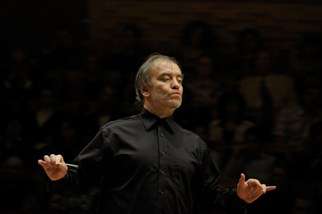|
Back
Catholic and Carnal New York
Isaac Stern Auditorium, Carnegie Hall
02/28/2016 - & March 2 (Naples, FL), 5 (Bogotà), 9 (São Paulo), 2016
Richard Wagner: Prelude and Good Friday Music from Parsifal
Pyotr Tchaikovsky: Manfred Symphony, Opus 58
Vienna Philharmonic Orchestra, Valery Gergiev (Conductor)

V. Gergiev (© Valentin Baranovsky)
That semi-reformed reprobate St. Augustine refers somewhere to the kinship between sensuality and religious ecstasy, a kinship which Valery Gergiev almost gleefully produced in his final concert here with the Vienna Philharmonic Orchestra.
Actually those two emotions came from the “inappropriate” composers. Richard Wagner had never subscribed to any bourgeois familial obligation, yet his music from Parsifal shows more than Elysian goodness, almost priggish in these angelic strains. Tchaikovsky, whose sexual longings led to restraint, obsession, guilt and (probably) suicide, wrote in his Manfred a work which–under Mr. Gergiev’s hands–became more sensual, even lubricious than anything else he had written.
Yet the duo on one program, with the warm, comforting and human sounds of the Vienna Philharmonic, offered both purity and adulteration in two magical hours.
Mr. Gergiev is one of the world’s great Wagnerian exponents, but the Act III Prelude and Good Friday music can be purely orchestral. And while the orchestra was meant to play only in the Bayreuth Festival House, designed by the composer himself, no great conductor can resist playing this in other concert halls. Carnegie Hall proved to have the warm, somewhat resonating sounds for the opening, when the Vienna Phil strings started the most holy work.
One could not say this was eccentric in any way. The most stunning feature was the consummate total control which Mr. Gergiev had over his orchestra in both sections. Beneath those slow-moving chords, some conductors try to provide a Tristan-like sexual flavor, but Mr. Gergiev needed none of that. This was so highly disciplined a performance that the blocks of chords seemed to float inevitably to the fore. We had, in fact, Medieval aura of music with those wondrous strings and the seraphic brass.
This was not coolness (Wagner could never be cool), but the chastity had the purity of monkish processions of Chartres more than Wagner’s ideal of his opera house.
Then again (one thought in the secular intermission), perhaps Mr. Gergiev had his epiphany not in Good Friday but in Palm Sunday. First, this was a Sunday performance. Second, his palm did not hold his long-gone lengthened baton (which used to fly off the handle) or the shorter chopstick. He used no tools to produce the sounds of the Vienna Philharmonic, only the palm of his hands.
Where Wagner’s passion was religious, Mr. Gergiev played a rare performance of Tchaikovsky’s Manfred, a long symphony inspired both by Byron’s poem, and Berlioz’ Symphonie fantastique. As well as another Byonic inspiration from Harold In Italy which showed up in the elegiac third movement.
If Wagner was the Passion of the Christ, Manfred was the passion of the guilt-ridden man. To those not familiar with the poem, Tchaikovsky’s treatment could have been simply personal torment. But Byron was bringing his own sexual and ghostly experiences to the music, and this is what Mr. Gergiev was attempting as well.
We started off with those ghostly hollow tones from the winds, followed by the strings and that equally haunting love theme. Throughout, Mr. Gergiev was pulling at the orchestra, giving them the chance for huge climaxes, then reaching back for even more emotion until the end.
Tchaikovsky can always be agonizing, but the popularity of his symphonies somewhat lessens the effects. That was hardly true here, and even in the pleasantly Russian second movement, we had a ghostly ending.
(And why not have Russian music in the Alps? Berlioz added that Hungarian March to Damnation of Faust, though Faust never got anywhere near Budapest! Tchaikovsky learned artistic license from a master.)
The end was a dazzling display of the Vienna Phil, with even the fugue an inevitable moment. Never inevitable is the organ in the last measures. Tchaikovsky really did transfer both the secrets of the poets and himself to the orchestra. An organ was really an interruption.
One only wishes that, after these personal, emotional Catholic/carnal offerings, Mr. Gergiev can return later. Despite the strikers and shouters outside Carnegie Hall (“Putin’s Friend!" "Putin Killed 8,000 People”), he was the Orpheus who easily silenced their protests.
Harry Rolnick
|